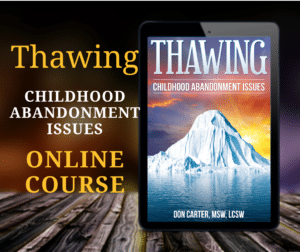
Time Killer Strategies – TA
Human beings have automated, subconscious “time killer” programs to help stave off boredom, receive strokes, and pass time — first you’re born… then you die… but there’s a whole lot of time to kill in between.
Strokes and Stroking
Giving and receiving love, support, recognition, and validation are referred to in TA language as Stroking. Another term for Strokes is “needs”… getting our needs met is the emotional nourishment that keeps us alive, growing, and motivated.
It’s theorized in TA that if Strokes are completely withheld from a person their central nervous system would deteriorate from lack of stimulation and they would eventually die… a condition called Marasmus. Stroke Economy is the term used to describe a person’s support network and environment. A person who feels depressed is likely to have a stroke deficit…i.e, not enough support and encouragement.
Time Structuring & TA

To avoid the pain of boredom, people seek something to do with their time. We can… structure time in six possible ways:
Withdrawal
As a time killer, withdrawing is sometimes a rational adult decision. People need a little “Me Time” to be alone. Time to think their own thoughts & take stock of themselves… to rest, relax, and restore energy… and then to once again make healthy contact with another person.
People can withdraw from others by removing themselves…
- physically – by leaving or retreating to another room
- psychologically – by withdrawing into fantasy
- emotionally – by staying in third position.
Even withdrawal into one’s fantasies is often legitimate — A good fantasy may be better use of time than listening to a bad lecture. Withdrawal helps us take that time for “me”.
Withdrawing is sometimes based on copying parents…imitating parental behavior. For example, a man threatened by conflict with his wife may withdraw as his father did when his mother got mad… He may leave the house, retire to the shop, or go to his study. Or, instead of physically leaving, he may go to sleep or simply “zone out” his wife – not hearing what she says.
When a person withdraws psychologically, it’s often into a fantasy world. These fantasies may be of uncensored pleasure or violence, creative imaginings, or of learned fears and catastrophic expectations. Extreme withdrawal can lead to isolation causing the person to have a scarcity of opportunities for healthy stroking in his or her environment which contributes to depression.
Rituals
Ritual time killer transactions are simple complementary transactions… such as greetings or goodbyes. Someone who says, “good morning, how are you?”… Is not necessarily asking about the other person’s health and feelings. Usually, the expected response is something like…”fine, how are you?” In TA this is referred to as a two-stroke ritual.
A common six-stroke ritual may look like this:
- A: Hi
- B: Hi
- A: How are you?
- B: Fine, and you?
- A: Fine. Well, see you later.
- B: Yeah, see you around.
A ritual time killer gives people a way of coming together. They save time in figuring out who should go first… or be served first… and so forth. Some cultures, church groups, political parties, secret orders, and social clubs structure their time with highly ritualistic patterns of behavior. Other groups are less structured, using their time in other ways.
For many people, rituals become a way of life… For example, after the ceremony is long past, the marriage may only be a series of ritualistic transactions consisting mainly of role-playing – devoid of any real meaning or intimacy – yet just enough strokes to keep the marriage alive.
Pastimes
Pastimes are time killer transactions people use to pass time with one another don’t know each other very well. Pastimes are any safe subjects, such as the weather, the stock market, the local football team, how bad kids are today – anything that keeps things superficial.
Pastimes and rituals are time killers people use to spend time together politely without getting involved at a deeper level. They provide the opportunity to get to know each other well enough to decide on further involvement in games, activities, or intimacy.
Psychological Games
In his classic book, Games People Play, Eric Berne defines a “Game” as:
- A patterned and predictable series of transactions which are superficially plausible but actually conceal motivations and lead to a well-defined predictable outcome.
Psychological games are habitual [neural networked] programs of behavior that exist in the implicit memory and run subconsciously – i.e., beneath the awareness of even the initiator of the game.
Another term for these time killers are the survival skills co-created by the Little Professor and the Adapted Child in order to adapt to the dysfunction of the home environment.
Some time killer games structure only short periods of time… For example, a secretary who plays blemish takes time to point out that the boss always forgets to put the “s” on the third-person singular verb or frequently misspelled “absence”.
Other time killer games are played regularly between friends and colleagues and especially between couples and family members on a daily basis…it may be the only way they know how to relate to each other. Games fit easily into the framework of Drama Triangle and always include a Victim, Rescuer, and/or Persecutor. They may be played with mild, moderate or severe intensity.
Activities
Activities are ways of structuring time that deal with external reality and are commonly thought of as work… getting something done…staying busy. Activities are time killers people choose because they want to, need to, or have to do them. Activities can be carried out alone or with others:
- Serving on a committee.
- Playing in a band
- working on a long-term project
- Getting a Masters Degree
- Building a house
- Engaging in hobbies
When some long-term and intensely involved activities come to an end, a person frequently feels empty, restless, or useless…This problem comes into sharp awareness when certain time structuring activities such as caring for children, going to college, or working on a long-term project suddenly come to an end.
When a person has devoted a huge amount of time and energy into a long-term endeavor they may create a neural network for the activity itself…it becomes habitual which can lead to work-a-holism. In the midst of activities, different ways of being together can emerge. Rituals, pastimes, games, and even intimacy may occur.
Intimacy
At a deeper level of human encounter than rituals, pastimes, games, and activities lie the potential that each person has for intimacy. Intimacy is free of games and free of exploitation. It occurs in those rare moments of human contact that arouse such feelings as desire, tenderness, empathy, vulnerability, and affection. Intimacy combines genuine giving and receiving with the candidness of “game-free” communication.
Intimacy as a time killer is often frightening because it involves the risk of being vulnerable. When we are in a personal relationship it calls for emotional involvement. Our Child ego state is the network location for experiencing and sharing OUR wants…OUR needs….OUR feelings.
- Being the Receiver in a healthy, intimate relationship requires the ability to experience our Child ego state — Asking for what we need and receiving it is carried out in First Position.
- Being the Giver in a healthy, intimate relationship requires the ability to experience our nurturing Parent ego state — Hearing our partner ask for what they need and giving it to them is carried out in Second Position.
Because in a healthy, intimate relationship people experience their more vulnerable Child ego state, many times it seems easier and safer to pass time or to play games than to risk feelings of either kind — affection or rejection — especially if intimacy was not safe nor role-modeled during childhood.
If the capacity for intimacy has been unnecessarily suppressed, it can be recovered. By activating and strengthening the Adult ego state, people can change in spite of their early life experiences.
Key Points: the Adult ego state operates from Third Position — Ideally the Adult consults with the Child and the Parent ego states to DECIDE several things…
As the Receiver…
- When it’s safe to express the needs and feelings of the Child
- How that expression should occur and in what context
- When it’s okay to “let down the boundary” and grant someone access to that vulnerable part of self.
- How to help the Child ES hear and accept the word “no” — respecting and trusting the decisions, autonomy, and boundaries of a partner
As the Giver…
- How and when to respond to what is being asked by a partner
- When is it appropriate and/or healthy to give a partner what they request?
- When is it inappropriate and/or unhealthy to give what is being asked …for you? …a partner? …Your relationship?
- How to say no or set boundaries in a firm yet loving way — i.e., a way that respects and validates the needs, autonomy, and feelings of a partner.
Recovering the capacity for intimacy is a major goal of TA and is one of the signs of an autonomous person who does not need to constantly engage in an unhealthy “time killer” that kills other things as well — such as chances for a fulfilling relationship.





